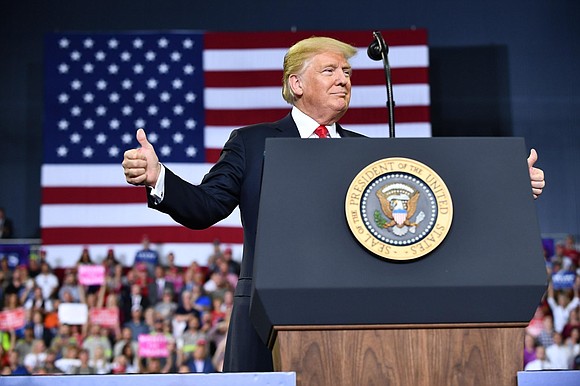Why Trump's numbers on economic approval aren't as high as they should be
CNN/Stylemagazine.com Newswire | 9/11/2018, 9:36 a.m.
By Grace Sparks
(CNN) -- President Donald Trump likes to take credit for the success of the economy, with unemployment at 4%, the lowest it's been since June 2000. He tweets often about the great economic conditions in the country and how he and his administration are responsible. He signed a massive and permanent corporate tax cut. He's playing hard ball with countries he says have been cheating the US for decades.
The number of people who say that the economic conditions in the country today are very or somewhat good has been on the rise since November 2016, when Trump was elected, and those who said the economy was good outnumbered those who said it was poor consistently for the first time since 2007. There was a small crossover in 2014, but it didn't stick.
And there's no doubt that this is Trump's economy.
Quinnipiac asked respondents in a recent August poll who they think is more responsible for the current state of the economy: former President Obama or President Trump. Those numbers have been slowly switching, with more and more giving Trump credit (52%) since his election. He pulled ahead of Obama in February 2018, and rose above 50% in the most recent poll.
But Trump's problem might actually be he's not getting enough credit. Economists say the country is at "full employment," meaning people who want work can find it. Given that seeming nationwide access to work, Trump's economic numbers should arguably be better than they are. Since 1997, when CNN began tracking the state of economic conditions, those economic approval numbers have directly tracked with unemployment.
As unemployment goes up, the positive perceptions of the economy go down and vice versa. The two, historically, have been interconnected. Likewise, when economic conditions and unemployment move, approval of how the President is handling the economy moves, too.
For example, in January 1999, when unemployment was only 4.3%, nearly nine-in-10 respondents said the economy was very or somewhat good, the highest it's been in CNN's tracking.
And presidential approval on the economy was very high. In March of 1999, at the top of the dot-com bubble in the stock market and near the end of his presidency, 78% of Americans who said they approved of the way President Bill Clinton was handling the economy, compared to his 64% overall approval in the Gallup/CNN/USA Today poll.
The current economy has not tracked as closely with Trump's economic approval rating. While unemployment has substantially decreased from 9.9% in December 2009, when only 13% said the economy was good, Trump's economic approval rating is only slightly higher than President Obama's in November 2009 -- when Obama's was 46%, with Trump's now at 49%.
Economic approval is actually a bright spot for Trump. His approval on the economy is his best approval rating in almost every single poll. For reference, in the same CNN poll where he received 49% approval on the economy, his approval on taxes was 45%, foreign affairs was 40%, foreign trade was 38%, immigration was 37%, environmental policy was 31%, and general approval at 42%.
But Trump's economic approval is not as high as Clinton, George W. Bush, and Obama received during high economy points in their presidencies. President Clinton's highest economic approval rating came in late March, 1999, with 78% approval of his handling of the economy. Coincidentally, that was the same month the stock market plunged. George W. Bush received a high of 72% in October 2001 (right after 9/11), and Obama's was in March 2009, at 59% approval, just after Congress approved massive stimulus packages to jump-start the US out of the Great Recession.
Trump's current economic approval is 49% in the most recent CNN poll, with two-in-10 Democrats approving of his job, half of independents, and 87% of Republicans. Obama's approval on the economy was also 49% in August of 2009 when the unemployment rate was much higher, about 9%. His economic approval among Democrats was at 88%, similar to Trump's among Republicans today. And his approval rating among Republicans was 13% compared to Trump's 20% approval among Democrats now.
President Bush was, like Trump, graced with very low unemployment rates, and it was reflected in his economic approval. In July, 2001, unemployment under Bush was at only 5%, very good but still higher than the rate today. By October of 2001, Bush saw a high in his economic approval at 72% overall, including 55% of Democrats, 68% of independents, and 92% of Republicans.
President Bill Clinton saw similar highs. When unemployment was at around 4% in March, 1999 -- close to where it is now -- Clinton's approval on the economy was 78% overall, 91% among Democrats, 76% for independents, and 64% among Republicans.
And this is where the current political polarization hurts Trump. With the economic approval of less than 90% of Republicans and only 20% of Democrats, Trump isn't close to those benchmarks enjoyed by Bush and Clinton.




